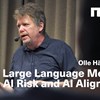models
European Social Models, Protection and Inclusion
Institute for Futures Studies Research Report 2009/1, 101p. The Member States of the European Union have agreed to promote the common goals of economic growth, quality of jobs and comprehensive social
The Outputs of Large Language Models are Meaningless
Cappelen, H. & R. Sterken (eds.) Communicating with AI: Philosophical Perspectives. Oxford: Oxford University Press Abstract In this paper, we offer a simple argument for the conclusion that the outp
Theoretically and empirically informed agent-based models
Johan Koskinen, University of Manchester Theoretically and empirically informed agent-based models and how it may be employed in Social Science.
Nondeterminacy, Two-Step Models, and Justified Choice
Ethics, Volume 129, no. 2, pp. 284-308. doi.org/10.1086/700032 Abstract This article analyzes approaches to nondeterminacy (e.g., incommensurability, indeterminacy, parity) that suggest that one can make
Adapting To Globalised Product And Labour Markets: New Models For Apprenticeship in Europe
The paper identifies two distinct models of apprenticeship in Europe: the well-established demand-driven model found and the more recently revived supply-driven model. The paper concludes that countri
Investigating sequences in ordinal data: A new approach with adapted evolutionary models.
Political Science Research and Methods, Volume 6, Issue 3, pp. 449-466. doi.org/10.1017/psrm.2018.9 Abstract This paper presents a new approach for studying temporal sequences across ordinal variables. I

Olle Häggström: Large Language Models, AI Risk and AI Alignment
Research seminar with Olle Häggström, a professor of mathematical statistics at Chalmers University of Technology, an affiliated researcher at the Institute for Futures Studies, and a member of the Ro
Olle Häggström: Large language models, AI risk and AI alignment
Venue: Institutet för framtidsstudier, Holländargatan 13 in Stockholm, and onlineResearch seminar with Olle Häggström, a professor of mathematical statistics at Chalmers University of Technology, an affi
Using Models to Predict Cultural Evolution From Emotional Selection Mechanisms
Emotion Review Abstract Cultural variants may spread by being more appealing, more memorable, or less offensive than other cultural variants. Empirical studies suggest that such “emotional selection” is

Systemic risk models as a policy prediction tool with Anders Sandberg
Presentation at the workshop "AI and autonomous decision making" at the Institute for Futures Studies in Stockholm, October 2017.








